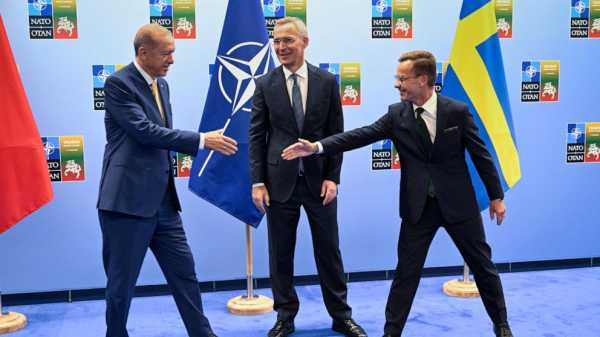
VILNIUS, Lithuania — NATO leaders gathered Wednesday to launch a highly symbolic new forum for ties with Ukraine, after committing to provide the country with more military assistance for fighting Russia but only vague assurances of future membership.
U.S. President Joe Biden and his NATO counterparts will sit down with Ukrainian President Volodymyr Zelenskyy in the new NATO-Ukraine Council, a permanent body where the 31 allies and Ukraine will sit as equals and be able to call crisis talks.
The setting is part of NATO's effort to bring Ukraine as close as possible to the military alliance without actually joining it. On Tuesday, the leaders said that Ukraine can join “when allies agree and conditions are met."
The ambiguous outcome reflects the challenges of reaching consensus among the alliance's current members while the war continues, and has left Zelenskyy disappointed. His mood may improve when security commitments for a post-war Ukraine are unveiled by the Group of Seven nations.
“We have to stay outside of this war but be able to support Ukraine. We managed that very delicate balancing act for the last 17 months. It’s to the benefit of everyone that we maintain that balancing act,” Belgian Prime Minister Alexander De Croo said as he arrived for the summit.
Latvian Prime Minister Krisjanis Karins, whose country lies on NATO's eastern flank and has a long, troubled history with Russia, said he would have preferred more for Ukraine.
"There will always be a difference of flavor of how fast you would want to go. But… at the end of it, what everyone gets, including Ukraine, and what Moscow sees is we are all very united,” he said.
Although Zelenskyy is attending the summit's final day in Vilnius, he has been sharply critical of what he described as NATO's “absurd” reluctance to set a timeline for his country's acceptance into the alliance.
In essence, Western countries are willing to keep sending weapons to help Ukraine do the job that NATO was designed to do — hold the line against a Russian invasion — but not allow Ukraine to join its ranks and benefit from its security while war rages on.
Zelenskyy said in a Tuesday speech in a town square in Vilnius that he had faith in NATO, but that he would “like this faith to become confidence, confidence in the decisions that we deserve, all of us, every soldier, every citizen, every mother, every child.”
"Is that too much to ask?” he added.
Symbols of support for Ukraine are common around the city, where the country's blue-and-yellow flags hang from buildings and are pasted inside windows. One sign cursed Russian President Vladimir Putin. Another urged NATO leaders to “hurry up” their assistance for Ukraine.
However, there's been more caution inside the summit itself, especially from Biden, who has explicitly said he doesn't think Ukraine is ready to join NATO. There are concerns that the country's democracy is unstable and its corruption remains too deeply rooted.
Under Article 5 of the NATO charter, members are obligated to defend each other from attack, which could swiftly draw the U.S. and other nations into direct fighting with Russia.
However, defining an end to hostilities is no easy task. Officials have declined to define the goal, which could suggest a negotiated ceasefire or Ukraine reclaiming all occupied territory. Either way, Putin would essentially have veto power over Ukraine’s NATO membership by prolonging the conflict.
Wednesday’s commitments will include a new G7 framework that would provide for Ukraine’s long-term security.
The British foreign ministry said the G7 would “set out how allies will support Ukraine over the coming years to end the war and deter and respond to any future attack. It is the first time that this many countries have agreed a comprehensive long-term security arrangement of this kind with another country.”
British Prime Minister Rishi Sunak said in a statement that supporting Ukraine’s “progress on the pathway to NATO membership, coupled with formal, multilateral, and bilateral agreements and the overwhelming support of NATO members will send a strong signal to President Putin and return peace to Europe.”
Although international summits are often tightly scripted, this one has seesawed between conflict and compromise.
At first leaders appeared to be deadlocked over Sweden’s bid for membership in the alliance. However, Turkey unexpectedly agreed to drop its objections the night before the summit formally began.
The deal led to boasts of success from leaders who were eager for a display of solidarity in Vilnius.
“This summit is already historic before it has started,” NATO Secretary-General Jens Stoltenberg said.
Erdogan has not commented publicly on the deal over Sweden's membership, even during a Tuesday evening meeting with Biden where Biden referenced “the agreement you reached yesterday."
However, Erdogan appeared eager to develop his relationship with Biden.
The Turkish president has been seeking advanced American fighter jets and a path toward membership in the European Union. The White House has expressed support for both, but publicly insisted that the issues were not related to Sweden’s membership in NATO.
___
Associated Press writers Karl Ritter and Liudas Dapkus contributed to this report.
Sourse: abcnews.go.com






